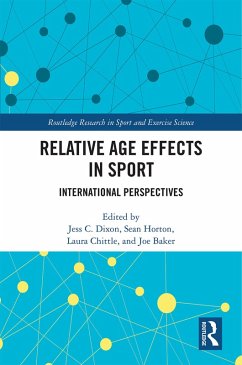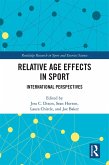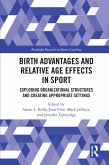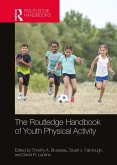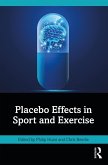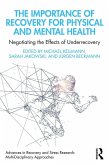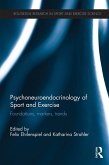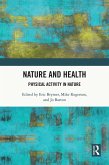Relative Age Effects in Sport (eBook, PDF)
International Perspectives
Redaktion: Dixon, Jess; Baker, Joe; Chittle, Laura; Horton, Sean
41,95 €
41,95 €
inkl. MwSt.
Sofort per Download lieferbar

21 °P sammeln
41,95 €
Als Download kaufen

41,95 €
inkl. MwSt.
Sofort per Download lieferbar

21 °P sammeln
Jetzt verschenken
Alle Infos zum eBook verschenken
41,95 €
inkl. MwSt.
Sofort per Download lieferbar
Alle Infos zum eBook verschenken

21 °P sammeln
Relative Age Effects in Sport (eBook, PDF)
International Perspectives
Redaktion: Dixon, Jess; Baker, Joe; Chittle, Laura; Horton, Sean
- Format: PDF
- Merkliste
- Auf die Merkliste
- Bewerten Bewerten
- Teilen
- Produkt teilen
- Produkterinnerung
- Produkterinnerung

Bitte loggen Sie sich zunächst in Ihr Kundenkonto ein oder registrieren Sie sich bei
bücher.de, um das eBook-Abo tolino select nutzen zu können.
Hier können Sie sich einloggen
Hier können Sie sich einloggen
Sie sind bereits eingeloggt. Klicken Sie auf 2. tolino select Abo, um fortzufahren.

Bitte loggen Sie sich zunächst in Ihr Kundenkonto ein oder registrieren Sie sich bei bücher.de, um das eBook-Abo tolino select nutzen zu können.
This new volume assists in communicating and mobilizing knowledge and research about RAEs, focusing on developing feasible and attractive solutions to the RAE and creating a resource that is accessible to professionals within the sport and educational communities.
- Geräte: PC
- ohne Kopierschutz
- eBook Hilfe
- Größe: 4.32MB
Andere Kunden interessierten sich auch für
![Relative Age Effects in Sport (eBook, ePUB) Relative Age Effects in Sport (eBook, ePUB)]() Relative Age Effects in Sport (eBook, ePUB)41,95 €
Relative Age Effects in Sport (eBook, ePUB)41,95 €![Birth Advantages and Relative Age Effects in Sport (eBook, PDF) Birth Advantages and Relative Age Effects in Sport (eBook, PDF)]() Birth Advantages and Relative Age Effects in Sport (eBook, PDF)43,95 €
Birth Advantages and Relative Age Effects in Sport (eBook, PDF)43,95 €![The Routledge Handbook of Youth Physical Activity (eBook, PDF) The Routledge Handbook of Youth Physical Activity (eBook, PDF)]() The Routledge Handbook of Youth Physical Activity (eBook, PDF)46,95 €
The Routledge Handbook of Youth Physical Activity (eBook, PDF)46,95 €![Placebo Effects in Sport and Exercise (eBook, PDF) Placebo Effects in Sport and Exercise (eBook, PDF)]() Placebo Effects in Sport and Exercise (eBook, PDF)40,95 €
Placebo Effects in Sport and Exercise (eBook, PDF)40,95 €![The Importance of Recovery for Physical and Mental Health (eBook, PDF) The Importance of Recovery for Physical and Mental Health (eBook, PDF)]() The Importance of Recovery for Physical and Mental Health (eBook, PDF)45,95 €
The Importance of Recovery for Physical and Mental Health (eBook, PDF)45,95 €![Psychoneuroendocrinology of Sport and Exercise (eBook, PDF) Psychoneuroendocrinology of Sport and Exercise (eBook, PDF)]() Psychoneuroendocrinology of Sport and Exercise (eBook, PDF)56,95 €
Psychoneuroendocrinology of Sport and Exercise (eBook, PDF)56,95 €![Nature and Health (eBook, PDF) Nature and Health (eBook, PDF)]() Nature and Health (eBook, PDF)43,95 €
Nature and Health (eBook, PDF)43,95 €-
-
-
This new volume assists in communicating and mobilizing knowledge and research about RAEs, focusing on developing feasible and attractive solutions to the RAE and creating a resource that is accessible to professionals within the sport and educational communities.
Dieser Download kann aus rechtlichen Gründen nur mit Rechnungsadresse in A, B, BG, CY, CZ, D, DK, EW, E, FIN, F, GR, HR, H, IRL, I, LT, L, LR, M, NL, PL, P, R, S, SLO, SK ausgeliefert werden.
Produktdetails
- Produktdetails
- Verlag: Taylor & Francis eBooks
- Seitenzahl: 182
- Erscheinungstermin: 7. Mai 2020
- Englisch
- ISBN-13: 9781000069426
- Artikelnr.: 59399260
- Verlag: Taylor & Francis eBooks
- Seitenzahl: 182
- Erscheinungstermin: 7. Mai 2020
- Englisch
- ISBN-13: 9781000069426
- Artikelnr.: 59399260
- Herstellerkennzeichnung Die Herstellerinformationen sind derzeit nicht verfügbar.
Jess C. Dixon is Head of the Department of Kinesiology and an Associate Professor of Sport Management at the University of Windsor, Canada. His primary research and scholarly interests are in the areas of strategic management in sport, executive leadership and human resource management in sport, and sport management pedagogy. He has also published extensively about relative age effects over the past decade. His research has been funded by the Social Sciences and Humanities Research Council of Canada (SSHRC), the Sport Canada Research Initiative (SCRI), and the North American Society for Sport Management (NASSM). Sean Horton is a Professor in the Department of Kinesiology at the University of Windsor, Canada. Sean's research interests lie primarily in the area of skill acquisition and expert performance, both in young people and as individuals age, along with various psychosocial components of sport and physical activity participation. His research is funded by the Social Sciences and Humanities Research Council of Canada (SSHRC) and the Ontario Trillium Foundation. Laura Chittle is a doctoral student in the Department of Kinesiology at the University of Windsor, Canada. She is funded by a Joseph-Armand Bombardier CGS Doctoral Scholarship, a Sport Canada Research Initiative Grant, and an Ontario Graduate Scholarship. Her previous work examined the moderating impact of academic timing on relative age effect patterns within intercollegiate sport, while her current dissertation studies pertain to evaluating the role that relative age has on athlete leadership development and positive youth development in sport. Joe Baker is a Professor in the School of Kinesiology and Health Science at York University, Canada. His research examines the varying factors affecting skill acquisition and maintenance across the lifespan, from issues of high performance athlete development to predictors of successful aging. He has held visiting researcher positions at universities around the world and is the author/editor of 9 books, 4 journal special issues and more than 200 peer reviewed articles and book chapters. He is internationally recognized as a world leader on the science of athlete development.
1. Serendipity Strikes
2. The Relative Age Effect: Early Studies
3. Antecedents and Explanations of Relative Age Effects
4. Relative Age Effects Are Developmental! The Necessity of Looking at More
Than One Time Point
5. Relative Age Effects in Female Athletes: Similarities and Differences
Highlight the Nuances of This Effect... If You Know Where to Look
6. Relative Age Effects and Youth Development
7. Late Birthday Benefits: The 'Underdog Hypothesis'
8. Tackling an Age-Old Dilemma Among Student-Athletes: Academic Timing and
the Relative Age Effect
9. The Relative Age Effect In Youth And Elite Sport: What Have We Learned
After 20 Years of Research?
10. Approaches to Help Coaches and Talent Scouts Overcome the Relative Age
Effect
11. Re-Balancing the Relative Age Effect Scales: Meta-Analytical Trends,
Causes, and Corrective Adjustment Procedures as a Solution
12. Concluding Thoughts and Future Research on Relative Age Effects in
Sport
2. The Relative Age Effect: Early Studies
3. Antecedents and Explanations of Relative Age Effects
4. Relative Age Effects Are Developmental! The Necessity of Looking at More
Than One Time Point
5. Relative Age Effects in Female Athletes: Similarities and Differences
Highlight the Nuances of This Effect... If You Know Where to Look
6. Relative Age Effects and Youth Development
7. Late Birthday Benefits: The 'Underdog Hypothesis'
8. Tackling an Age-Old Dilemma Among Student-Athletes: Academic Timing and
the Relative Age Effect
9. The Relative Age Effect In Youth And Elite Sport: What Have We Learned
After 20 Years of Research?
10. Approaches to Help Coaches and Talent Scouts Overcome the Relative Age
Effect
11. Re-Balancing the Relative Age Effect Scales: Meta-Analytical Trends,
Causes, and Corrective Adjustment Procedures as a Solution
12. Concluding Thoughts and Future Research on Relative Age Effects in
Sport
1. Serendipity Strikes
2. The Relative Age Effect: Early Studies
3. Antecedents and Explanations of Relative Age Effects
4. Relative Age Effects Are Developmental! The Necessity of Looking at More
Than One Time Point
5. Relative Age Effects in Female Athletes: Similarities and Differences
Highlight the Nuances of This Effect... If You Know Where to Look
6. Relative Age Effects and Youth Development
7. Late Birthday Benefits: The 'Underdog Hypothesis'
8. Tackling an Age-Old Dilemma Among Student-Athletes: Academic Timing and
the Relative Age Effect
9. The Relative Age Effect In Youth And Elite Sport: What Have We Learned
After 20 Years of Research?
10. Approaches to Help Coaches and Talent Scouts Overcome the Relative Age
Effect
11. Re-Balancing the Relative Age Effect Scales: Meta-Analytical Trends,
Causes, and Corrective Adjustment Procedures as a Solution
12. Concluding Thoughts and Future Research on Relative Age Effects in
Sport
2. The Relative Age Effect: Early Studies
3. Antecedents and Explanations of Relative Age Effects
4. Relative Age Effects Are Developmental! The Necessity of Looking at More
Than One Time Point
5. Relative Age Effects in Female Athletes: Similarities and Differences
Highlight the Nuances of This Effect... If You Know Where to Look
6. Relative Age Effects and Youth Development
7. Late Birthday Benefits: The 'Underdog Hypothesis'
8. Tackling an Age-Old Dilemma Among Student-Athletes: Academic Timing and
the Relative Age Effect
9. The Relative Age Effect In Youth And Elite Sport: What Have We Learned
After 20 Years of Research?
10. Approaches to Help Coaches and Talent Scouts Overcome the Relative Age
Effect
11. Re-Balancing the Relative Age Effect Scales: Meta-Analytical Trends,
Causes, and Corrective Adjustment Procedures as a Solution
12. Concluding Thoughts and Future Research on Relative Age Effects in
Sport
